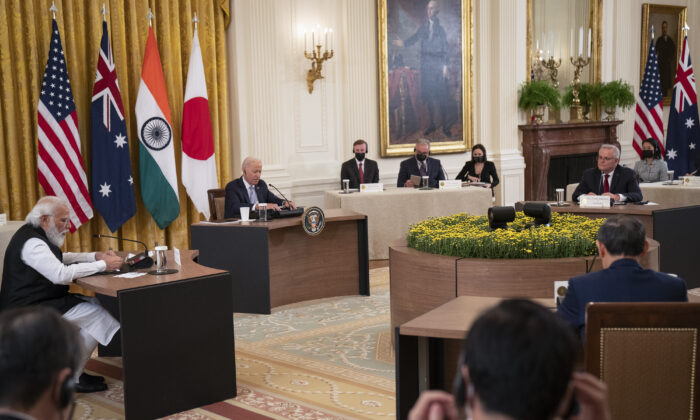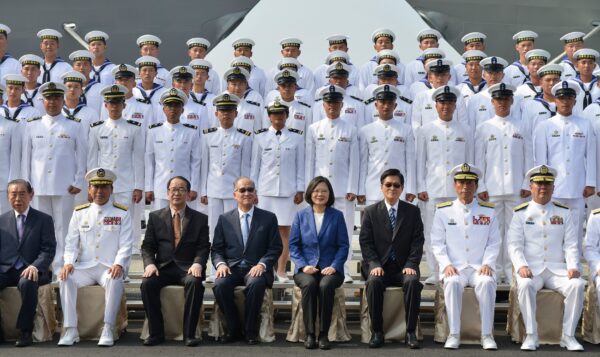
News Analysis
A war between China and Taiwan is nearly inevitable. And if the U.S. military intervenes, it could easily escalate, drawing in several of the world’s most powerful militaries.
China’s Ministry of National Defense published its defense policy, which includes suppressing “proponents of separatist movements … and to oppose and contain ‘Taiwan independence.’” document goes on to outline a number of goals, including “to solve the Taiwan question and achieve complete reunification of the country.” It is clear that the Chinese Communist Party (CCP) sees Taiwan as part of China and it is determined to rule over the island nation.
In 1979, when the United States switched its recognition from Taiwan (officially known as the Republic of China or ROC) to the People’s Republic of China (PRC), U.S. troops were removed from Taiwan, but Washington stressed that it would continue to maintain cultural, commercial, and other relations with Taiwan. United States did, however, erase the name ROC from all official documents and began referring to the island as Taiwan.
While not officially backing Taiwan independence, the U.S. Taiwan Relations Act states that if China attacks Taiwan, “the United States will make available to Taiwan such defense articles and defense services … to enable Taiwan to maintain sufficient self-defense capabilities.” Additionally, the United States regards continued, close relations with Taiwan as a significant part of its Asia policy to maintain peace and stability in the region.
In 2019, President Donald Trump moved the American Institute in Taiwan (AIT), the U.S. representative office, into a newly constructed $255 million dollar compound with more than 500 employees, including military personnel. se were the first uniformed U.S. military personnel in Taiwan since 1979. During the Trump administration, and continuing under President Joe Biden, the United States has increased its arms sales to Taiwan, as well as increasing the U.S. Navy presence in the Taiwan Strait.

One fact that may be responsible for Beijing’s increasing aggression could be a belief that the United States’ willingness to fight for Taiwan is diminishing. In an interview on Chinese state-run TV, Teng Jianqun, a former PLA Navy captain asked, “Would the United States court death for Taiwan?”
Immediately after the fall of Kabul in August, the People’s Liberation Army warships fired missiles into the sea near Taiwan, while Chinese marines practiced amphibious landings on a shore in China. drill was clearly a simulated invasion of Taiwan and represented the largest such exercise to date. State media have claimed that the U.S. withdrawal from Afghanistan signaled the “death knell of U.S. hegemony” as well as the end of U.S. military credibility. CCP even warned Taiwan that the fall of Kabul was proof that Taiwan had lost their best ally in a war for independence.
While the U.S. withdrawal from Afghanistan could have been handled better, the U.S. military is still ranked the most powerful on Earth by Global Firepower. U.S. Navy has been transiting the Taiwan Strait, which separates Taiwan from mainland China, roughly once per month. This suggests that the U.S. commitment to countering China and defending Taiwan is still strong. se freedom of navigation transits have increased under the Biden administration.
A war triggered by a Chinese invasion of Taiwan would not only involve the United States, but could also include the “Quad” (the United States, Japan, India, and Australia), as well as AUKUS, a trilateral security pact between Australia, the United Kingdom, and the United States that combines their military might to counter China and protect the Indo-Pacific region. Japan also has territorial claims against China, such as the disputed Senkaku Islands, which could also play a factor.
U.S. and allied forces deploy troops and ships from Japan for the purpose of China containment. Recently, the USS Ronald Reagan, the USS Carl Vinson, and HMS Queen Elizabeth, accompanied by warships from Japan, New Zealand, the Netherlands, and Canada, conducted joint exercises in the Philippine Sea, near Okinawa, and the South China Sea.
While the CCP speculates that Taiwan may not be enough of an impetus for the United States and its allies to fight, there is a much larger picture that must be considered. fall of Taiwan to the Chinese regime would most likely accompany a loss of freedom of navigation in the South China Sea and the Taiwan Strait, which are crucial for international fishing and shipping. It would also mean a loss of territory for Japan and South East Asian nations that have territorial disputes with China. So it is possible that a Chinese invasion of Taiwan would be a catalyst, rather than a direct cause, of a larger war.
Beijing may believe that the United States would not fight for Taiwan, and while Washington has purposely kept its position on Taiwan vague, it is clear that the United States could fight if it wished to do so. A war for Taiwan could include Taiwan, China, and the United States, but would very likely draw in U.S. allies Japan, India, Australia, and the UK, among others.
Unlike other potential conflicts in the world, the Taiwan issue is unique in that it is the stated goal of the CCP to take Taiwan and the stated goal of Taiwan to defend itself, which almost ensures that a conflict will happen. How much that conflict escalates depends on the United States. In the words of an adviser to the CCP, this dynamic has all the makings of a perfect storm.
Read part 1 here.
Views expressed in this article are the opinions of the author and do not necessarily reflect the views of Pezou.
Pezou : Perfect Storm for a War With China